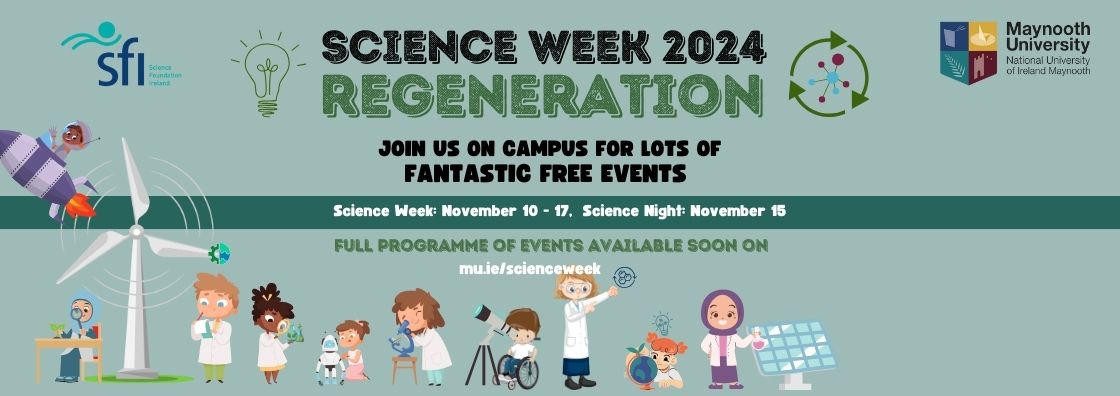Science Week 2024: Regeneration
Save the date! Join us at Maynooth University for Science Week 2024, taking place from November 10th to 17th.
We have an exciting lineup of events scheduled throughout the week, with a special Science Night on November 15th.
Science Week Event Highlights
- November 13, 7pm: Talks and Tours of the Science and Ecclesiology Museum - booking link available below!
- November 14, 6:30 - 8:30pm: Ozempic ‘Unravelling fact from fiction' an interactive panel discussion with Prof. Donal O'Shea and Dr Andy Hogan. This event delves into the complexities of a drug which has become a hot topic - leading to many questions, misunderstandings and myths. Hybrid event, book your free tickets using the link below!
Science Night
Science Night will take place on Maynooth University campus on Friday November 15th, from 6 – 8:30pm.
Join us for an exciting evening of fun free events for children of all ages – robot soccer, chemistry experiments, star gazing, CSI Maynooth and LOADS more! There will be something for everyone. Booking essential for Chemistry Shows, CSI Maynooth and Robot Soccer, ALL other Science Night events are unticketed. Click the link below for more details about Science Night 2024! All events are FREE to attend.
What's on at Maynooth University during Science Week 2024:
Date & Time |
Event |
| 13 November, 7 - 8pm | Talks and Tours of the Science and Ecclesiology Museum - click here to book your tickets |
| 14 November, 6:30 - 8:30pm | Ozempic ‘Unravelling fact from fiction' an interactive panel discussion with Prof. Donal O'Shea and Dr Andy Hogan |
| 15 November, 3pm - 5pm | Learn about DNA robotics and DNA computation! Explore DNA nanotechnology with Prof. Damien Woods and the TAPDANCE team. An exclusive STEM Lab Tour for Transition, 5th, and 6th Year Students booked through teachers only! Free registration closes November 11th at 5 pm and can be booked here. Places are limited, so book early to avoid disappointment! |
| 15 November, 6pm - 8:30pm | Click here for Science Night 2024 details! |
Traveling to Maynooth University:
By car: we recommend parking in car park 14 or car park 1 by the Students' Union (see more on this campus map). Parking will be free on campus from 5pm.
Public transport: more details here.

